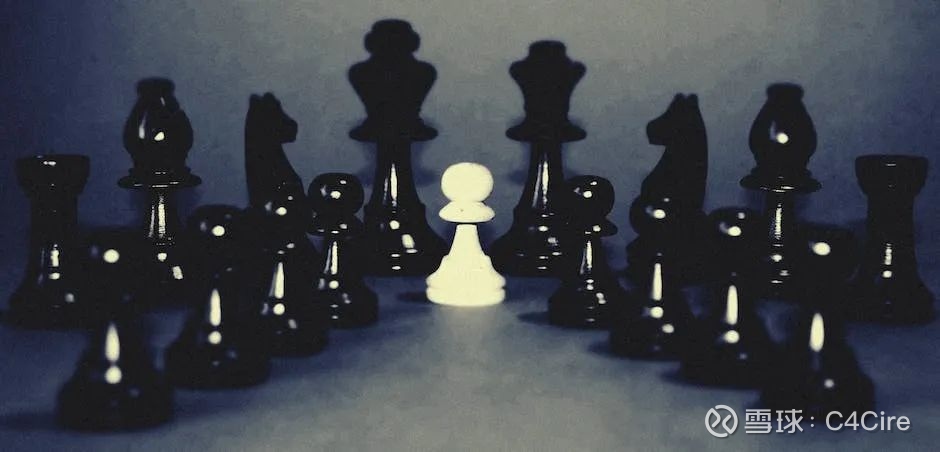
Text/CxEric
If an investor believes that “stock prices are unpredictable,” he must admit two things at the same time:
1. The rise is unpredictable, including the magnitude;
2. The decline is unpredictable, including the magnitude.
In this way, he can achieve basic logical self-consistency.
He couldn’t tell me that while the rise was unpredictable, the fall was predictable.
This is paradoxical.
This should have been common sense.
But people who have been in the stock market for a long time often forget this common sense. They will look for some “special” reason to argue that the stock will never fall, or value, or policy, or main force, or fate.
Although, Mr. Market never cares about your fate.
01
I can understand the mood of “value investors”, but I stubbornly think, “I choose good companies, so they will not fall”, “If it falls, it is the fault of the market”, so there is no need.
First, there has never been an obvious linear mapping relationship between company quality and stock price trends. It is not that good companies will not fall, and bad companies will not rise.
Otherwise, both speculation and investment will lose most of their room for activity.
In fact, even value investing theory never promises:
As long as this is done, the stock will not fall.
It’s a promise at most:
If you do, you should be able to be more rational;
If you do, you should be able to get a good night’s sleep.
For both, the market goes its own way, rising and falling are neutral actions, and it does not deliberately reward/punish anyone.
In the book “Money Game”, there is a sentence that captures this market reality brilliantly:
“The stock in your hand doesn’t know you own it. The price has no memory, and yesterday has nothing to do with tomorrow.”
Yes,
The stock in your hands does not know your existence,
Your awe-inspiring market doesn’t know your name.
The stock price doesn’t care about your love-hate relationship as a human being.
Even if it hurts you, even if your heart hurts.
When the market ignores your feelings, it is more indifferent than the most heartless scumbag.
Because it is ignorant and unconscious, and you have to pay a heart by mistake.
Otherwise, why do you hate it?
Otherwise, what are you scolding it for?
Likewise, when Mr. Market hammers a stock, he doesn’t care what the concept is.
core assets? Super track? XX benefit? growing up? Blue chip? Maotai in X?
So what?
These are just fragile, cheap labels created subjectively by humans. Believe it or not, by next year, they’ll be creating a bunch of cool new stuff, and then throwing the old labels away without hesitation.
A master of randomness that doesn’t care about human feelings and ignores artificial labels.
So naturally, there is no “label” that promises that the stock price won’t fall.
No matter how nice its name is.
I think, if I can figure this out, maybe the mental distress caused by the stock price can be cut in half?
02
When an investor is very optimistic about a certain stock, or is tied to a certain stock with high interests, he will often join such a kind of prediction/guessing game, with certainty:
If a stock falls to XX yuan, the broader market will fall below 2000 points, which is absolutely impossible;
If a stock falls by more than 30%, what will happen to the economy, it is impossible;
as well as,
Unless XX (some serious macro event) occurs, it is impossible for the stock to fall below XX yuan.
Every time I see it, I think, isn’t this a kind of stock price prediction?
If stock prices are predictable, why didn’t they anticipate this decline in advance?
If the stock price is unpredictable, what is the basis for their certainty that “it will not fall more than XX%”?
Confused.
In addition, these views have a bit of a psychological bias of exaggerated self-esteem.
The underlying mentality behind these views is: If even my stock falls and I pay a heavy financial price, then investors and economic players all over the world should join me, or even worse than me , which is reasonable.
But in fact, as long as you are in the market long enough, you will find:
1. In the stock market, the vast majority of the “impossible” are finally possible.
2. There are countless ways in the market to seriously damage someone’s financial account and seriously injure a popular stock. After that, the market still operates safely, and the XX incident has not happened.
That is, there is always a possibility: even if all your stocks are wiped out, the sun will still rise from the east, and A shares will continue to start normally tomorrow.
This possibility is not small.
The joys and sorrows of human beings are not the same. In most cases, you can only be saddened by the heavy losses you have encountered in the financial market, and no one will remember it after a year or a half.
The market is ignorant and ruthless.
You, your holdings, are not that important to the market either.
Therefore, the only one you want to protect is yourself;
So, the only one who can protect you is yourself.
Don’t expect a “mechanical seance”.

03
I often find that when a person is certain that a certain stock will not fall, so coincidentally, that is his holding, and it is likely to be a heavy position-sometimes, the heavy position is more than 100%.
Well, it’s a coincidence that your stocks will not fall, and others will fall.
From this perspective, it is difficult for us to distinguish the certainty of the stock price. What is the reason?
There may be three possibilities.
The first possibility is that he can really predict the stock price.
Well, there’s not much to say about this.
The second possibility is that he is suffering from the “endowment effect” – after owning something, he unconsciously overestimates its value.
There is a good test for this psychological bias.
Imagine if I stole your stock account today and quietly sold out your holdings, but you only found out after a week, and the stock price happens to be the same as a week ago, ask: Will you buy it back at the original price?
If the answer after your serious feeling is NO, it means that your “firmness” and “confidence” in the stock may be just a psychological bias.
The third possibility, all this is out of “fear”.
Expecting something to happen too much will unconsciously overestimate the probability of its occurrence;
Excessive aversion to something happening will unconsciously underestimate the probability of it happening.
If an investor is full of money, the “big drop” is what he is most afraid of, so he can’t help but constantly underestimate the possibility of a drop.
But there are countless examples of how the human brain does a poor job of understanding probability.
Of course, there is another possibility – he sees it very clearly in his heart, but he is too afraid to escape from reality, and keeps shouting to encourage himself: no, no, no, impossible, impossible.
At this point, I remembered a bad joke on the debate field.
“There is nothing absolute in this world!”
“Absolutely not?”
“absolute……”
04
In the Analects of Confucius there is a chapter “Zi Jue Four”:
Zijue Four: No intention, no necessity, no solidity, no me.
The general idea is that Confucius abstained from four things: meaning, certainty, solidity, and self.
What does that mean? Zhang Ju explained it this way:
“Because the human heart is inherently false and bright, it is only driven by material desires, and it cannot follow anything.
For the future of things like things, first have a mind of speculation, which is called intention .
There is also a mind dedicated to the Lord, which is called must .
The thing has passed, but it remains in the heart and cannot be freed from it. This is called solidification .
As long as it is convenient for you, regardless of the justice of the world, this is called me . “
“These four things are impossible for human beings to disregard. If I were my Master, I would be a great duke, and things would follow suit. Before the event, there would be no selfish intentions, and there would be no expectations. After the event, there would be no stubbornness or selfishness. Self. His mind is as always bright as a mirror, without some obstructions.”
Don’t take it lightly.

05
In the face of unpredictable stock prices, the best mentality is not to assume that the stock price will not fall, but that after the stock price falls, investors are confident that I have a way to deal with the fall.
It’s not that you won’t fall, but you’re not afraid of falling.
or,
Come on, I have my own way of dealing with it.
On this matter, nothing is better than “Sun Tzu”:
“Therefore, in the way of using the army, if you don’t rely on it, it won’t come, but you can wait for it. If you don’t rely on it, you won’t attack, you can’t attack it if you don’t rely on it.”
grandson said,
In fighting a war, you can’t rely on “bad things won’t happen,” and you can’t rely on “the opponent won’t hit me.”
In a war with soldiers, you can rely on: if something bad happens, I have a way to deal with it; if the opponent attacks, I have a defense.
Sound like a cliché?
Do not.
According to my observation, what the vast majority of investors do all day is conversely, highly “relying on them not to come” and “relying on them not to attack”
– Don’t be afraid, the stock price will not fall;
——Don’t be afraid, even if it falls, it will not exceed XX%.
——With this psychological premise, they can bravely go in and go out seven times, Bo Yibo bicycles become motorcycles, all in at every turn, and every warehouse is filled with money.
Therefore, if Sun Tzu can speculate in stocks, he will definitely warn investors:
What you can rely on is definitely not the assumption (fantasy) that “the stock price will not fall”,
Instead,
Even if the stock price does drop, you have a way to deal with it.
Therefore, investors may wish to do an imaginary experiment:
Imagine if your love stock suddenly fell sharply, would you be able to bear it?
Is it possible to “live”?
what should you do?
Do you really have the means to cope?
If the answer is: I don’t know, I can’t, I can’t bear it – then maybe you’re not ready to hold this stock, or maybe you’re doing a risky thing and hoping for luck or something. degree of fluke.
After all, the eternal problem in the art of war world is that the opponent is disobedient.
In the same way, the eternal problem of the stock market is: the stock price is not obedient.
end
All investors have one lesson they can’t skip: dealing with the downturn.
In this homework, you generally have two problem-solving ideas:
1. You predict all the big dips and avoid them;
2. You give up on predicting a crash, but prepare for it, and then take it bravely.
A friend said after listening: Impossible, how could anyone predict all the big falls?
I agree: it is true that no one can predict all the big falls, as long as you live long enough, sooner or later you will encounter: unpredictably, the stock price suddenly falls sharply.
If you can accept this reasoning, then my second question is:
So why can’t this day be – today?
We all admit that we can’t predict every stock price drop, and we all know that as long as we stay in the market, we’re going to suffer a sudden, big drop.
That being the case, that day could come at any time.
Like yesterday, like today, like tomorrow.
If by coincidence you were playing a game that you “can’t afford to lose” at the time, your financial situation would have been completely rewritten.
This is a basic mathematical rule: no matter how many positive numbers are multiplied before, as long as you multiply by 0 once, the final result is zero.
You will be kicked off the table.
Therefore, the key to surviving in this market is not to bet on which day and which stock the crash will occur, but to be well prepared, and even if that day comes, you can still live strong .
This is a lot like an advertisement for an insurance company:
You Can’t Predict. You Can Prepare.
You can’t predict, but you can prepare.

— END —
Note: Originally published in Snowball in 2018, it was revised once in 2021. This time, it was substantially rewritten so it is version 2.0. Maybe there will be version 3.0 in a year or two.
Finally, if you’re interested in the topic of “the big drop” and “what to do with the big drop”, I recommend reading the following articles:
1. Reread “The Intelligent Investor”: Graham’s Investing Psychology
2. The Misunderstood Fisher and Growth Stocks (Part 2): 5 Things Fisher Doesn’t Suggest
3. 10 tips for your friends on a big day
Thanks for reading.

There are 27 discussions on this topic in Snowball, click to view.
Snowball is an investor’s social network, and smart investors are here.
Click to download Snowball mobile client http://xueqiu.com/xz ]]>
This article is reproduced from: http://xueqiu.com/4373567778/234014213
This site is for inclusion only, and the copyright belongs to the original author.